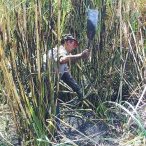English · Español

7 de julio de 2009 | Entrevistas | Agrocombustibles en Colombia | Soberanía Alimentaria
Cultivating Dirty War
Interview with Juan Manuel Garces on the links between agrofuels and Plan Colombia
Length: 2 minutes 36 seconds
Descargar: MP3 (1.8 MB)
Scientist and researcher of the region of Valle del Cauca, Juan Manuel Garces is a member of the Latin American Center of Prospective and Strategy. His participation in the formal meeting between the International Mission of Verification on Agrofuels in Colombia and the local environmental authority (CVC) set a clear relation of forces to explain the agrofuel boom, related with the US military plans in Colombia.
The problems faced by the US in the Middle East to get their fuel has led to a brutal crackdown in the south of Latin America, especially in Valle del Cauca, Colombia, with devastating effects in nature, the local communities and the economy.
In an interview with Real World Radio, Garces talked about this. “There is a link between the Plan Colombia the US international policy, Alvaro Uribe’s government and agrofuels”. The alliance with the local oligarchies is necessary to make this work.
Also, massacres to populations by the paramilitary take place in regions rich in sugar cane and palm oil plantations “enabling for the narco military to occupy lands left by the people displaced” to plant more agrofuels.
Two decades ago, one of the paramilitary groups was celebrating the purchase of its 180th hectare, and so far there have been many deaths, dirty war and narcodollars.
The state institutions in charge of watching the enforcement of the environmental rules, do not act in their region, but they leave an empty space that is occupied by the forces supporting the agrofuels business, which in the case of Colombia are brutally concentrated in a small group of businessmen.
“This becomes a ’life or death’ issue and the bureaucracies take no stand”, Garces says. He claims the Colombian state is accomplice of the violations of the communities rights that are forced to leave their lands to let the refinery business go on.
He said there is scientific evidence that shows for instance, the effects that the intensive use of glyphosate herbicide has on stem cells.
The consequence is the increase of cases of malformations, tumors, allergies and other unidentified damages. “The problems are unheard of, we need a socio-environmental authority with a systematic approach, but all that with real guarantees from the state institutions”.
He believes the presence of an international mission in their territories has a huge political and social weight, and it is the only way to favor policies to change these reality as “Colombia without foreign intervention does not change anything, and we might all get killed here”.
Artículos relacionados
- Más desplazamientos
En Colombia desalojan a 123 familias de la Hacienda Las Pavas, en el municipio de El Peñón (Bolívar) pese a las solicitudes internacionales en contrario - Haciendo historia en el camino
Mientras recorremos el “mar de caña” de las inmediaciones de Palmira, en Cali Colombia dialogamos con Francisco Luna, dirigente cortero - Resistencia comunitaria
Entrevista a Liliana León, sobre la movilización para salvar el humedal de Timbique en el valle del Cauca, Colombia - En el mar de la caña
Entrevista a un productor de “La Pailita” en el Valle del Cauca, que resiste al monocultivo cañero en su zona








